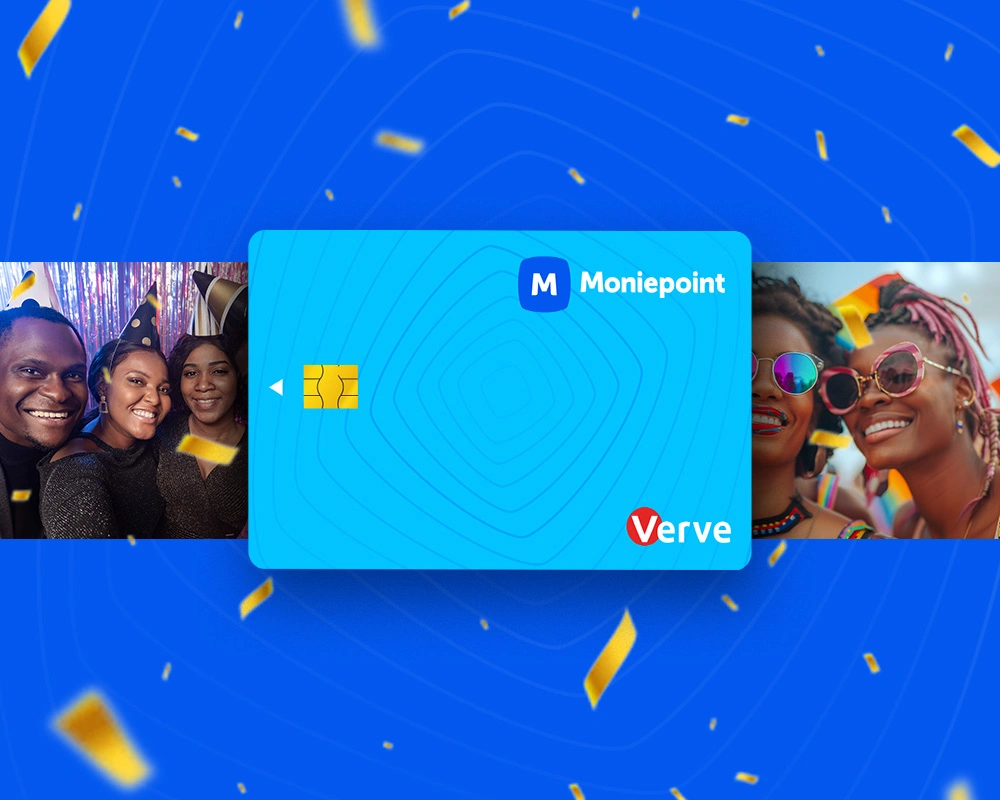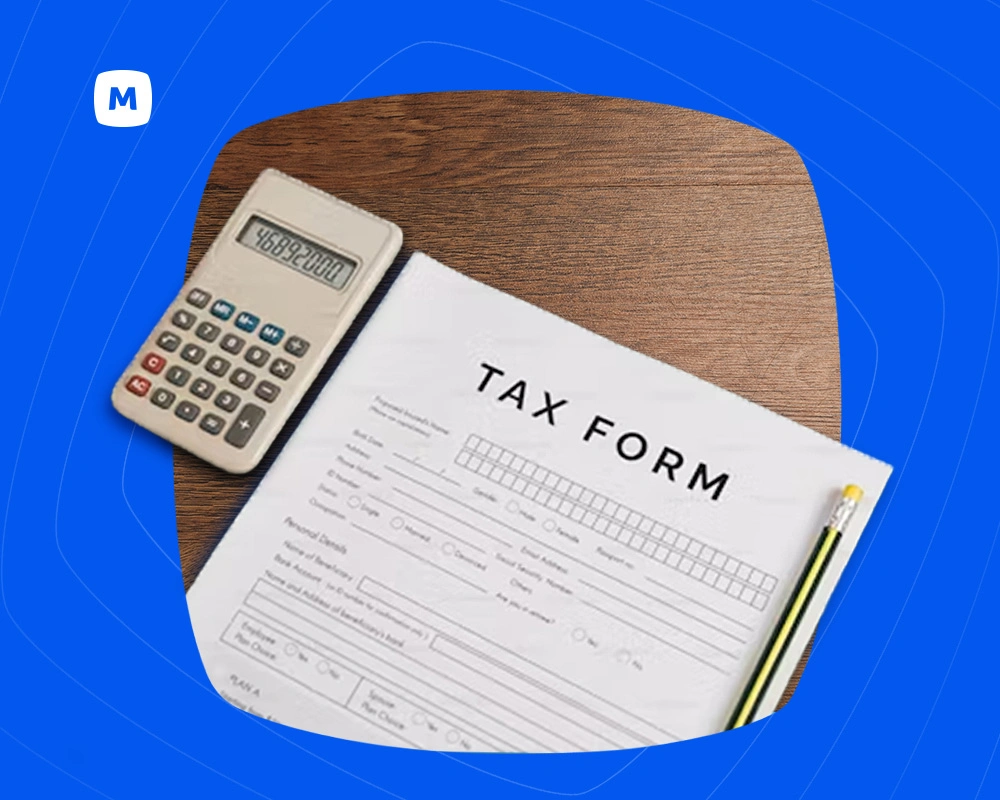Are you curious about the percentage of women in business?
We have curated our top women-owned business statistics in Nigeria you must know.
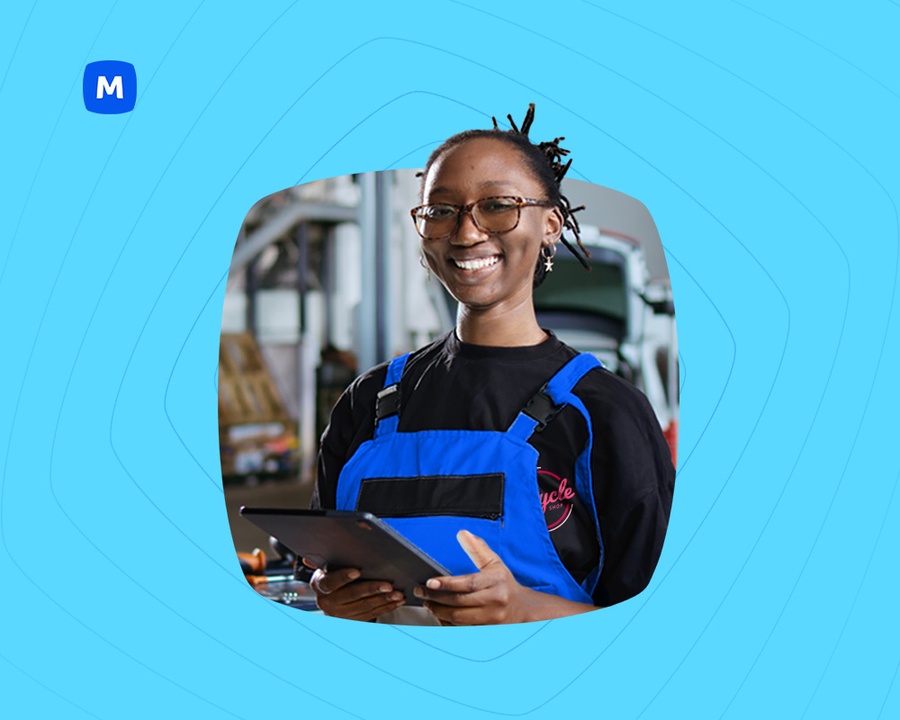
Every morning, just after sunrise, Mama Odun opens her shop in a corner of the bustling market in Oyo state. To her customers, she’s a familiar and trusted face they can patronise whenever they visit the market.
But to us at Moniepoint, she represents much more - she’s part of the evolving community of women entrepreneurs who are boosting the Nigerian economy daily.
Women like Mama Odun now account for 40% of new businesses, telling the story of vision, reliance, and economic impact.
As women-owned businesses grow, they contribute 37% of Nigeria’s GDP, boosting a wave of empowerment across the nation.
What Do the Statistics Say? Businesses Owned by Women in Nigeria.
1. ‘In terms of new businesses, 32% of businesses surveyed were created in the last year while female-led businesses accounted for 40% of businesses created’ [1]
2. ‘Majority of these new businesses created by females are in sectors such as Trade (40%), Advertising and Marketing (11%), Events and Entertainment (7.5%) and Agriculture (7.3%).’ [1]
3. ‘Of the surveyed MSMEs, 42 % were owned by women. Women MSMEs typically operate in the wholesale, retail, education, and other service sectors. Surveyed women-owned businesses were growing as fast as male-owned businesses.’ [3]
4. ‘Out of every 100 businesses in Nigeria, 39 are female-owned. This implies a 39% female business ownership rate in the country, higher than 29% in sub-Saharan Africa and 34% global average, according to data from the World Bank.’ [1]
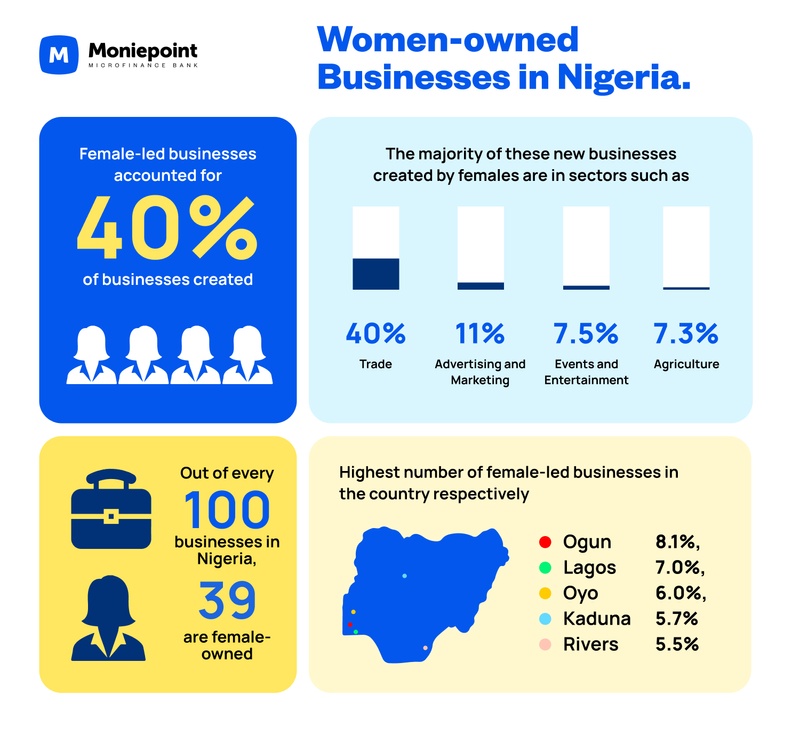
5. ‘For every ten working women in Sub-Sarahan Africa, nine of them work in the informal economy’ [2]
6. ‘While unemployment was the leading motivation for starting a business among men, we found that insufficient income from more formal employment was the higher motivation among women.’ [2]
7. ‘While 16 states in Nigeria performed above the national average of 0.63, 12 out of these 16 states are in the south, with Ogun state ranking highest as the number of female-led businesses surpassed that of male’ [1]
8. ‘An enterprise is classified as woman-owned if a woman or several women own more than 51% of the enterprise, or if a woman or women own 20% or more of the business, and a woman is chief executive officer, chief operating officer, president or vice president, and at least 30 % of the board of directors comprises women, where a board exists.’ [3]
9. ‘Women-owned businesses in the survey sample were younger than male-owned businesses, with women-owned businesses existing for an average of 7.4 years compared with 10.3 years for male-owned MSMEs’ [3].
10. ‘Ogun, Lagos, Oyo, Kaduna and Rivers had the highest number of female-led businesses, accounting for 8.1%, 7.0%, 6.0%, 5.7% and 5.5% of total female-led businesses in the country, respectively’ [1]
Access to Finance by Women-owned Businesses
11. ‘Almost half of the women-owned MSMEs surveyed by IFC (44 %) said they were more likely to choose a financial services provider representing women in marketing and staff. For 27 %, competitive interest rates and fees were more important than a ‘for women’ brand.’ [3]
12. ‘Around 47% of men-owned MSMEs took loans to support their business while 45% of female-owned MSMEs used credit facilities. However, the amount of loans taken differed greatly between the genders. While men received an average of N93,000, that for females was N57,000.’ [4]
13. ‘For 30% of MSMEs, including women-owned, getting loans from Moniepoint is the first time they’ve accessed credit. And for the other 70%, Moniepoint provides them with two to three times the last loan they could get from typical financial institutions.’[2]
14. ‘Male-owned MSMEs tend to rely more on loans, with 47% seeking credit facilities, while 45% of female-owned MSMEs turn to loans to support their businesses.’ [5]
15. ‘Women MSMEs found access to finance as challenging as male MSMEs (16% and 19%, respectively). Key challenges faced by women starting a business include time to care for family and children (41%), perception of lack of management competence (31%), and disadvantage in raising initial capital (24%).’ [3]
16. ‘Almost half of the women-owned MSMEs surveyed by IFC (44%) said they were more likely to choose a financial services provider that represents women in marketing and staff. For 27%, competitive interest rates and fees were more important than a ‘for women’ brand.’ [3]
When it Comes to Entrepreneurial Training Received
17. ‘Even though only 40% of entrepreneurs reported that they had acquired skills to better run their businesses, 99.7% of female entrepreneurs and 99.2% of youth entrepreneurs that attended trainings reported that the trainings have been helpful for their businesses’ [1]
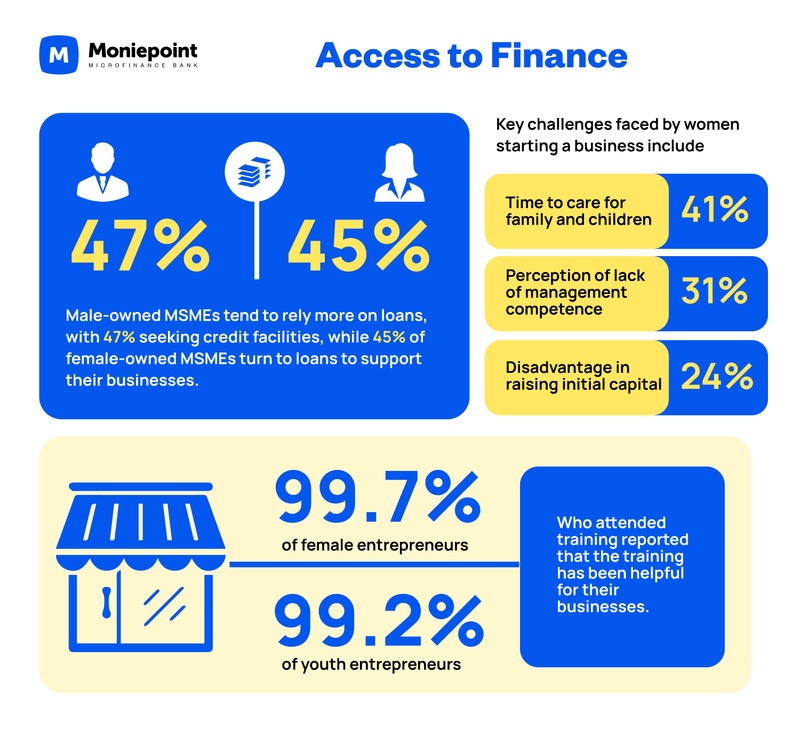
What about the Adoption of Digital Financial Systems?
18. ‘A new study by Small Firm Diaries published by the National Bureau of Statistics (NBS) showed that (97%) of MSMEs had a bank account, but less than 50% used it regularly.’ [4]
19. ‘Digital payments accounted for 46.2%, split between card payments and transfers.’ [2]
20. ‘The IFC survey suggests that bank account ownership is high among MSMEs (95%), and evenly spread across sectors. The majority of MSMEs use business accounts for their transactions, but a third (37%) of the overall sample used only personal accounts.’ [3]
21. ‘The use of personal accounts is higher among micro, informal, and women-owned MSMEs, and more common in agriculture and retail trade’ [3]
22. ‘Cash is the dominant method for MSMEs to receive payments for products and services (84%), although a majority also use bank transfers (55%), and some use money transfers (12%). MSMEs noted that cash is the easiest, fastest and safest form of payment for their business. The acceptance of alternative payment methods increased with the size of the business.’ [3]
23. ‘Of the respondents using mobile banking, 74 % found it saves them time, 70 % said it was more convenient, while 49 % considered it safe and easy to use.’ [3]
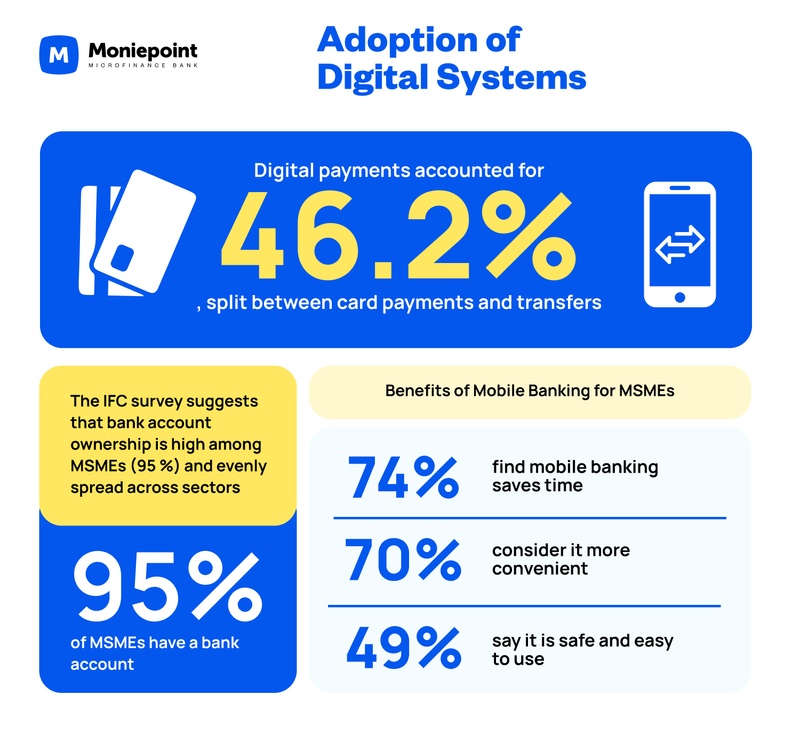
Type of Business Registration Done
24. ‘ For registered businesses, including female-owned, CAC (67%) topped the list of organisations they are registered with, followed by SMEDAN (23.1%).’ [1]
How Moniepoint Helps to Shape Women-led MSMEs in Nigeria
The informal business sector, which comprises women-owned businesses, has significantly boosted the country’s economy. However, some major challenges include the inability of these MSMEs to access traditional banking services and credit facilities. Moniepoint provides;
A supportive distribution system: Moniepoint has created a distribution system that relies on local presence to provide digital payment solutions. Because of the trust and recommendations received from their communities, more businesses are likely to recommend Moniepoint.
Making access to banking services easier: Moniepoint provides access to systematic banking benefits and tools such as business accounts, loans, and more that specifically meet the needs of MSMEs.
Simplifying access to credit: Moniepoint has gained insight into the financial history of businesses that use our services. This, along with a credit assessment system built specifically for informal businesses, means we can provide credit to them in a way that matches their needs and gives them a better chance at success.
Final Words
From busy marketplaces to innovative startups, Nigerian women entrepreneurs like Mama Odun are constantly shaping the economy. However, certain challenges remain a reality, like access to financial services and digital tools.
At Moniepoint, our tailored services are designed to enable women entrepreneurs to reach the next level of their dreams. Are you ready to take your business further? Sign up with Moniepoint now and boost your chances of getting convenient and speedy business financial services.
Sources
State of Entrepreneurship in Nigeria Report 2022 - fatefoundation.org
Moniepoint Informal Sector Report 2024 - Moniepoint MFB
Market Bite Nigeria - IFC World Bank Group 2022
40% of MSMEs in Nigeria are owned by women – NBS. NairaMetrics
